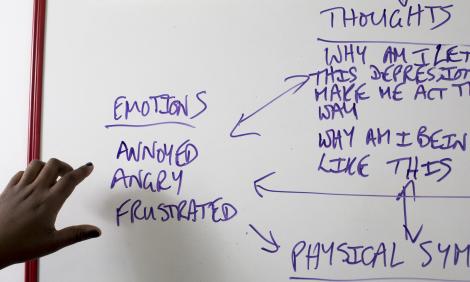CBT therapist
Cognitive behavioural therapy (CBT) therapists are trained to assess and support children and young people or adults with common mental health or severe mental health problems.
CBT is a talking therapy that aims to help people manage their problems by changing the way they think and behave. It is most commonly used to treat anxiety and depression, but it can be used for other mental health problems like psychosis, or physical health problems such as chronic pain.
Life as a CBT therapist
You’ll work with adults or children and their carers from many different backgrounds. Usually, you will deliver CBT one to one, but it can also be used in a group setting.
You’ll work alongside other clinicians, such as psychological wellbeing practitioners (PWPs), clinical psychologists, mental health nurses or psychiatrists. Your work may involve managing referrals and signposting people to other agencies, which will require you to work closely with other healthcare professionals, employment and education advisers and support staff.
You could work in a variety of mental health settings, including:
- adult NHS Talking Therapies for Anxiety and Depression (formerly known as IAPT) services
- NHS services for people with severe mental health problems
- NHS children's and young people's mental health services (CYPMHS - formerly CAMHS)
- third-sector organisations commissioned by the NHS
Services can be based in GP practices, healthcare centres or other community venues.
You will be provided with ongoing supervision to help you engage in self-reflection, seek and respond to feedback, and develop your professional knowledge and skills.
Gareth Stephens
High intensity cognitive behavioural therapist
Real-life story - Gareth StephensSeeing people change their lives for the better and knowing I’ve helped them do that is the best part of my job.

How much can I earn?
If you’re employed by the NHS, you’ll be on a national pay and conditions system called Agenda for Change (AfC).
There are nine pay bands and you’ll usually be paid at band 6 while you train. After completing your training, you’ll be paid at band 6 or 7, and can progress to higher bands with experience.
Terms and conditions can vary if you are employed outside the NHS.
How about the benefits?
As a CBT therapist you can:
- make a difference
- work flexible and part-time hours
If you’re employed by the NHS, you’ll also have good holiday entitlement and access to:
- fully-funded training plus a salary while you train (if NHS funded)
- an excellent pension scheme
- NHS discounts in shops and restaurants
Must-have skills
You’ll need a range of skills as a CBT therapist, including:
- excellent interpersonal skills and the ability to build relationships with a range of people from all backgrounds
- the ability to work well within a multidisciplinary team
- a good understanding of mental health issues
- strong written and verbal communication skills, tailored to a variety of audiences
You'll also need to be able to demonstrate the values of the NHS Constitution.
Entry requirements
There are nationally-funded ways to train as a CBT therapist:
- NHS Talking Therapies CBT therapist normally need to complete a high intensity NHS Talking Therapies postgraduate diploma training course.
- CBT therapists with adults with severe mental health problems, normally need to complete a postgraduate diploma in CBT for people with psychosis or bipolar disorder, a diagnosis of personality disorder or eating disorders.
- children and young people’s CBT therapist normally need to complete a children and young people postgraduate diploma training course.
It's also possible to become a CBT therapist by gaining an equivalent accreditation from other training and experience.
You will normally need to have a degree to join the postgraduate diploma courses, but you may also be able to access the training if you can demonstrate equivalent academic skills.
The courses are aimed at mental health professionals (or those with the equivalent knowledge, skills and attitudes) with experience in a mental health environment. The BABCP has more detailed information about these requirements.
You would also need to show strong interpersonal skills and an openness to acquiring new knowledge and skills.
How to become a CBT therapist
Training courses are offered by a range of universities and training providers, so course titles may vary. They typically consist of approximately 60 days of training over a 12-month academic year. During training, you will be employed by a local NHS commissioned service.
To find a trainee role within the NHS, search on NHS Jobs for ‘trainee CBT therapist’ or trainee high intensity therapist’. You can also see some current vacancies below.
Where a career as a CBT therapist can take you
As a CBT therapist, you’ll specialise in treating either children and young people or adults. You may also develop areas of clinical specialism or work with particular groups of patients, such as:
- adults with long-term conditions
- people with psychosis, bipolar disorder, eating disorders or a diagnosis of a personality disorder
You may also have opportunities to progress into more senior CBT therapist roles, where you could supervise other CBT therapists or manage aspects of a service. It may also be possible for you to complete further funded psychological training.
It’s important to note that a two-year psychological professions funding rule policy was implemented on 1 April 2022. This means that if you start NHS-funded psychological professions training from April 2022, you won’t be eligible for NHS funding for further psychological profession training for two years from the expected completion date of your first training, where it would lead to a change in your job role.
Visit the funding for psychological professions training programmes web page for more information about NHS funding.





